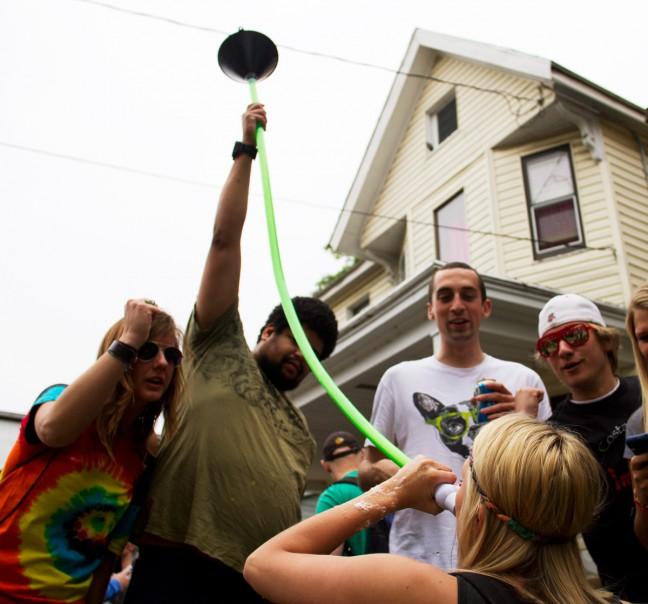As Badgers both new and old flood the University of Wisconsin campus this fall, a renewed pressure greets them — the pressure to party.
UW now tops the Princeton Review’s list of “party schools,” put together using experience from real students about Greek life, academics, drugs and alcohol. Though many students jump around for joy at this recognition, the institution itself recoiled at the ranking.
Officially, UW referred to alcohol use on campus as “a pressing public health concern that negatively impacts campus safety and students’ academic progress and well-being.”
The same statement also mentioned the AlcoholEdu program that is mandatory for incoming freshmen. No one, however, brought up the equally important Tonight program about consent and sexual assault, despite the proven relationship between heavy drinking and sexual violence.
Alcohol and sexual assault
Compared to stone-cold sober schools (mostly religious and military institutions), party schools experience 600 percent more on-campus sexual assaults. Of course, when evaluating sexual assault prevalence reports, one must consider the fact that due to cultural pressures, stigmas and risk of re-traumatization, under reporting dramatically affects statistics about rape.
Presence of heavy drinking culture further complicates risks of reporting, as survivors may feel guilty, fear blame or simply not remember what happened. Perpetrators lean on alcohol as an excuse, dodging responsibility and perpetuating toxic victim blaming. Both party schools and rape culture rely on alcohol as a scapegoat to shift blame onto the survivor and away from the perpetrator.
The recent release of Brock Turner is a chilling reminder of how rape culture uses party schools to create excuses for rapists through excessive drinking. Turner sexually assaulted an unconscious student behind a dumpster before leaving her naked body and returning to the fraternity house where the party took place.
When it comes to sexual assault, the problem is not alcohol or even inebriation. The problem is that through a patriarchal lens, presence of alcohol somehow immediately excuses the rapist while further blaming the survivor for being drunk.
But we know better. The majority of sexual assaults occur with people familiar to the victim. No matter the circumstances, a rapist is just that — a rapist.
As the fall semester commences, please keep Badgers safe by watching out for one another and intervening at parties or other events. Distracting a potential perpetrator or victim can make all the difference and only takes a minute. Uphold the true definition of consent as a clear, freely-given, enthusiastic, continuous yes and not the absence of a no.
“Freely-given” means no coercion is present, including coercion via alcohol. Anyone who slurs, vomits, passes out or shows any other signs of inebriation cannot give consent.
Going Greek
Sorority members are 74 percent more likely to experience sexual assault than their non-Greek peers, and fraternity brothers are at higher risk for committing sexual assault. These statistics appear grim, but remember — the majority of people in fraternities do not rape.
Unfortunately, minority populations commit major crimes, and fraternities breed an ideal environment for potential rapists. Many fraternities encourage toxic levels of masculinity, insisting that manliness comes from aggression, physical strength and overpowering weaker individuals.
Pledge and rush season present a particularly high risk for students, as they occur early in the year when everyone wants to find their place on campus. Perhaps unsurprisingly, sexual assault rates among freshmen women spike in October, or the “red zone.”
The first few months of the first two years of college present the highest risk, as students acclimate to their new environment, begin to experiment with drinking with people they may not completely trust and often explore the intense party culture attached to Greek life.
Every university wants to be the exception to these harmful cultural norms, but before UW could even officially begin the fall semester, Badgers received a campus crime alert for sexual assault in a fraternity. Not only did the assault occur in a fraternity house on Langdon street, but the perpetrator used drugs to commit an act of sexual violence. These crimes occur right at home on our campus.
Athletics
Party culture and athletic events go hand-in-hand at UW. Many events — but particularly Badger games — are traditionally accompanied by binge drinking.
Athlete status also often acts as a shield against sexual assault reports. For example, many media headlines referred to Brock Turner as an “ex-swimmer” rather than a rapist. Media coverage of countless sexual assault cases emphasize the loss of a great athlete rather than mourning the survivor’s deprivation of basic human rights and well-being.
Any campus environment drenched in worship for athletes creates an atmosphere poisonous for reporting. It takes great courage for a survivor to come forward at all, let alone come forward to report a revered campus athlete.
In addition, the hyper masculinity running rampant in fraternities also exists in sports. The desire to overpower or win in sports culture translates easily to sexual violence. Even when survivors come forward to report athletes, they might be ignored or discouraged by administration seeking to avoid bad publicity.
Make no mistake — I do not seek to condemn all members of Greek life or athletics as potential perpetrators. But the numbers do not lie — one in three college sexual assaults are committed by athletes and fraternity brothers are three times more likely to rape than other men.
To stop rape and sexual assault, we must closely examine prevalence of certain factors. Reckless party culture perpetuates rape culture. If this fact makes you uncomfortable, good. Everyone deserves a safe campus and the promise of justice in incidences of violence — and we hurt our chances of granting this justice when we deny the realities of sexual assault.


